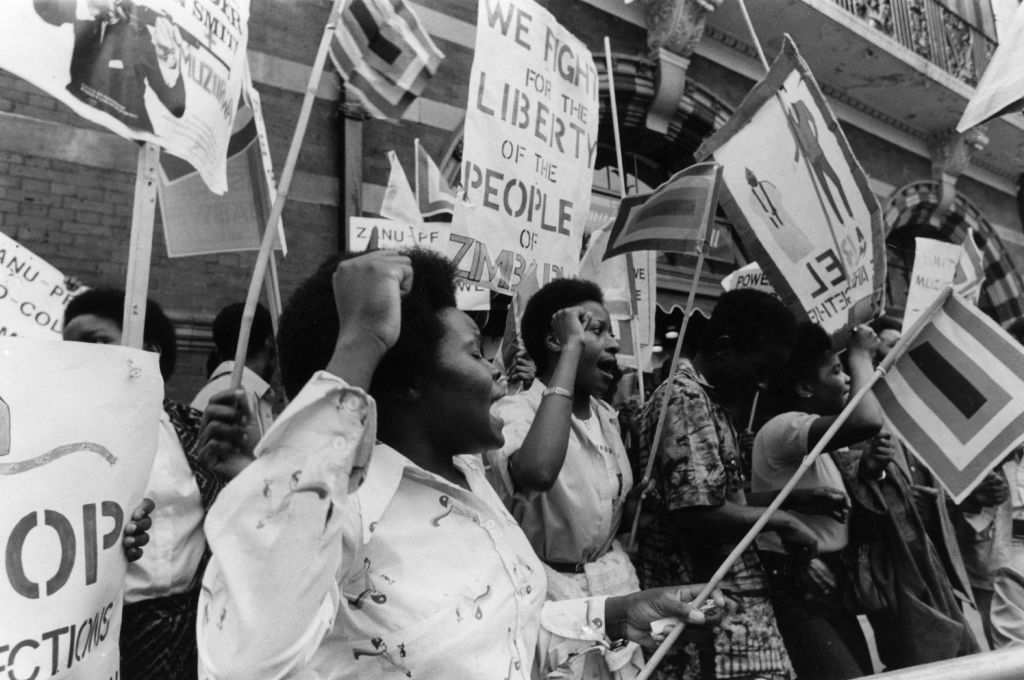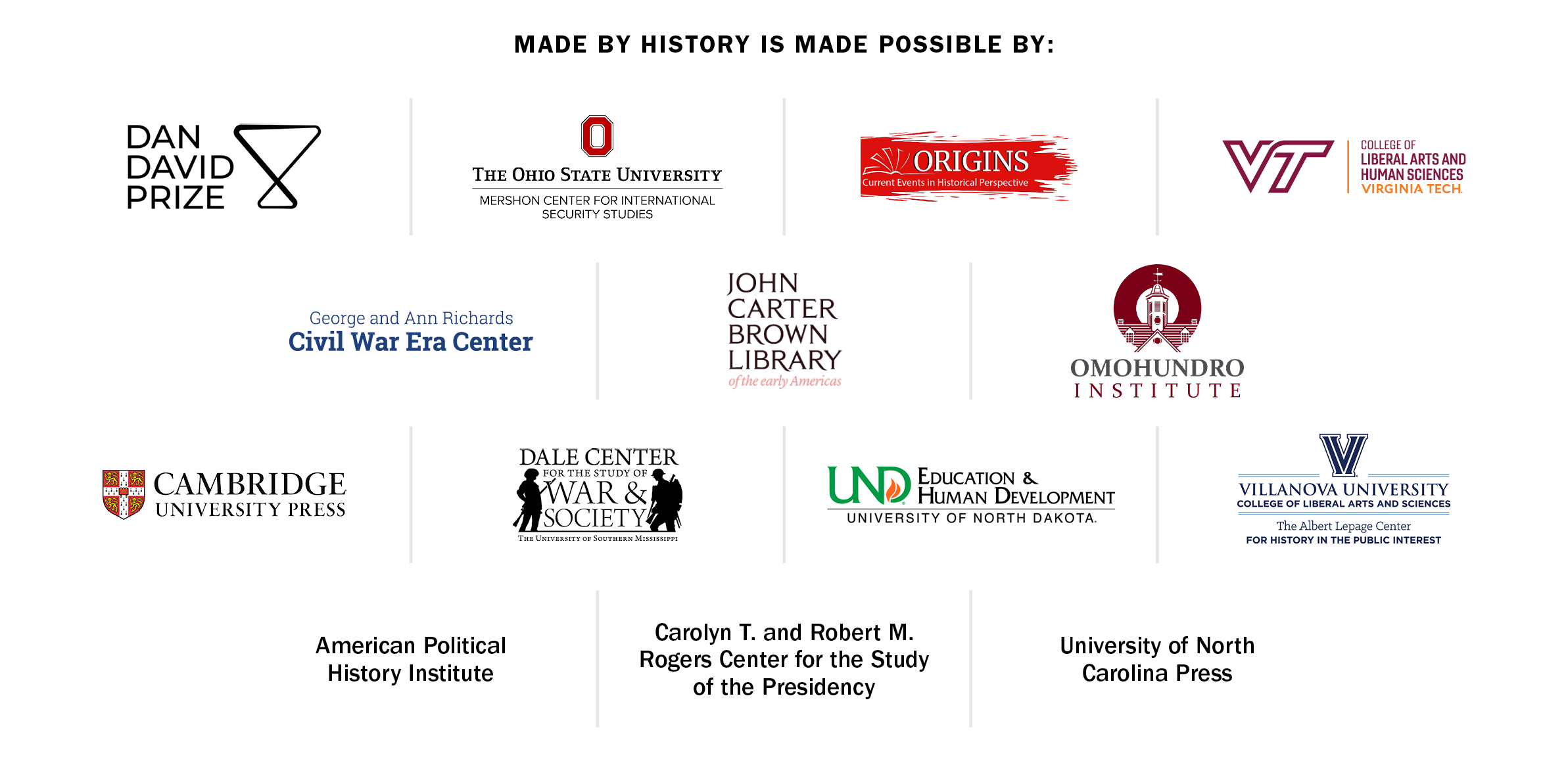
“A small white minority seizes control of the state apparatus, quashes the judiciary, censors the media, imprisons opposition leaders, and establishes a one-party state.”
This line does not describe the United States, but rather Rhodesia, a white-ruled settler colony in Southern Africa that declared independence in 1965. Rhodesia’s illegal independence and white minority rule, over territory that is now Zimbabwe, didn’t unfold in a vacuum. Even critics of the regime lent tacit support or failed to truly condemn it—and by prioritizing their own interests, extended its life and the harms it imposed. These events offer lessons for the U.S. today as we see erosions of democracy evoke all-too-tepid responses.
Rhodesia was a colony ruled by a narrow minority of its population—white people comprised just 7% of the country. White business owners and elites benefited from this arrangement, drawing support from working class white people whom they manipulated to fear their fate, should the country embrace democracy. Black people, who comprised 93% of the population, lived far below the poverty line, subsisting on per capita incomes of $500, compared to $18,482 for their white counterparts.
This small colony at the periphery moved to the center of the world stage on Nov. 11, 1965, when Prime Minister Ian Smith announced a Unilateral Declaration of Independence (UDI), severing the colony's relationship with the United Kingdom—without authorization from the British parliament. The illegal move signaled that the white-ruled regime would reject any movement toward majority rule, meaning that its majority Black population would remain subjugated.
Read More: The White Power Mercenaries Fighting For the Lost Cause Around the World
Rhodesia’s independence came amid widespread decolonization, with mass movements for independence arising after World War II. Britain had been forced to grant independence to most of its colonies based on the principle of majority rule.
Knowing that the United Nations and the Commonwealth would never recognize Rhodesian-style independence, Britain denounced Rhodesia’s illegal action and refused to recognize its independence until it showed a willingness to move toward majority rule. The Commonwealth was a British-led organization linking the United Kingdom to its former colonies, a potent symbol of its great power past. African members demanded an even stronger response. Rallying under the slogan, “No Independence Before Majority Rule,” many threatened to leave the Commonwealth if London did not impose majority rule as a precondition for Rhodesian independence.
Although the U.K. was sympathetic to Rhodesia's white population, many of whom had emigrated from Britain after World War II, it hoped to hold the Commonwealth together and refused to recognize the renegade state. However, it quickly undermined its public display of opposition.
Describing the Rhodesian outlaws as British “kith and kin,” London declared that it would not use force to bring Rhodesia back to legality and opposed all-out economic warfare. Instead, it proposed a limited set of economic sanctions, the purpose of which was not to bring the rogue prime minister to his knees, but to make him “reasonable.” It urged the international community to do likewise.
The United Nations Security Council followed Britain’s lead, enacting selective voluntary sanctions that prohibited the sale of military equipment and petroleum products to the Rhodesian regime. One year later it added selective mandatory sanctions. It was not until May 1968 that the Security Council imposed comprehensive mandatory sanctions, prohibiting any economic or diplomatic relationship with the rebel state.
The lag time of over two years before comprehensive mandatory sanctions were imposed gave Rhodesia time to restructure its economy, develop new markets, and devise sophisticated means of selling its products clandestinely. It found willing partners on several continents. Some U.N. member states openly flouted the sanctions resolutions. Apartheid South Africa and the Portuguese colonial regime in Mozambique served as conduits for Rhodesian imports and exports. They ignored the U.N. call for a boycott of Rhodesian goods—helping the outlaw state sell its products and supplying it with petroleum, military equipment, and foreign exchange.
The U.S. publicly claimed to support majority rule and endorsed Britain’s actions. Washington feared that if it failed to oppose the rebel regime, it might drive newly independent African states toward the communist powers and away from its own orbit. Moreover, coming at the height of the U.S. civil rights movement, Rhodesia’s unilateral declaration of independence required a race-sensitive response. However, many in the U.S. government were sympathetic to Rhodesian whites. The United States also had strong ties to Portugal, a NATO member that provided the U.S. with critical Cold War services, and apartheid South Africa, where it had significant economic interests.
Read More: Winnie Madikizela-Mandela Turned Anger Into Action During Apartheid
Faced with conflicting interests, Washington devised a two-pronged strategy. It would publicly denounce the breakaway state, but privately engage in actions that prolonged its life—and protected both Portugal and South Africa.
Recently declassified documents cast light on Washington’s subterfuge. In a secret State Department telegram written in October 1966, the U.S. Consul General in Cape Town offered advice to South African Prime Minister John Vorster. He said Pretoria must distance itself from Rhodesia to evade the anger of “extreme Afro-Asians” in the Commonwealth, who would push to expand sanctions to South Africa if it continued to support the rebel state. Sanctions would not only punish South Africa, but they would also undermine U.S. economic interests in the apartheid state.
Washington’s determination to protect its allies—while claiming to denounce white minority rule in Rhodesia—extended to Portugal. In May 1966, a State Department official warned that “…Portugal by helping break the boycott was calling African attention to itself and its African territories.” Unless the flow was stopped, the official “felt sure that the Security Council would expand mandatory sanctions to include those countries, and this could be stopped only by a veto.” He doubted that the either the United States or Britain which would cast a veto, which would undermine their public disavowal of the Rhodesian regime.
But subsequent events shredded even the facade of U.S. support for majority rule. In 1971, Congress passed the Byrd Amendment to the Military Procurement Authorization Act, which allowed the importation of “strategic and critical” materials from Rhodesia, including chrome and 21 other minerals, so long as there was no similar ban on such imports from communist countries. A Rhodesia lobby, supported by pro-segregation southerners in the U.S. Congress and several U.S. businesses, had pushed hard for the amendment.
Read More: Our Nation Is Still Divided Along the Battle Lines of the Civil War
This loophole added years to the life of the white-ruled state by providing it with the foreign currency needed to buy weapons and petroleum. The Western powers’ refusal to hold Rhodesia to account culminated in a 14-year war between Africans fighting for liberation and the Rhodesian security forces—a conflict that resulted in the loss of some 20,000 lives.
Even with outside support, Rhodesia was in dire straits. By the late 1970s, the war, a worldwide recession, and the toll of sanctions forced Rhodesia to the bargaining table. In 1979, the rebel regime was compelled to accept a settlement that eventually led to majority rule.

In 2023, the United States is faced with a constituency of white people who feel threatened by the advancement of U.S.-born racial and ethnic minorities and of immigrants from the global south. Some have openly embraced Rhodesia as a model for preserving minority rule. Political and business leaders see aligning with anti-democratic forces as serving their interests—resembling the dynamics at work in Rhodesia on the eve of its independence.
The case of Rhodesia has much to teach us about the ways in which self-proclaimed critics of a renegade regime professed to support human rights, democracy, and respect for the rule of law, but in fact prioritized their own self-interest and prolonged the regime’s life, which ultimately led to civil war. As the 2024 elections approach, die-hard supporters of the extremist minority will not be swayed by evidence. But perhaps lessons from Rhodesia may sway the fence-sitters.
Elizabeth Schmidt is professor emeritus of history at Loyola University Maryland. A scholar-activist, she has written six books about Africa, covering U.S. involvement in apartheid South Africa, women under colonialism in Zimbabwe, the nationalist movement in Guinea and foreign intervention in Africa from the Cold War to the war on terror.
Made by History takes readers beyond the headlines with articles written and edited by professional historians. Learn more about Made by History at TIME here.
More Must-Reads From TIME
- The 100 Most Influential People of 2024
- Coco Gauff Is Playing for Herself Now
- Scenes From Pro-Palestinian Encampments Across U.S. Universities
- 6 Compliments That Land Every Time
- If You're Dating Right Now , You're Brave: Column
- The AI That Could Heal a Divided Internet
- Fallout Is a Brilliant Model for the Future of Video Game Adaptations
- Want Weekly Recs on What to Watch, Read, and More? Sign Up for Worth Your Time
Write to Elizabeth Schmidt / Made by History at madebyhistory@time.com
